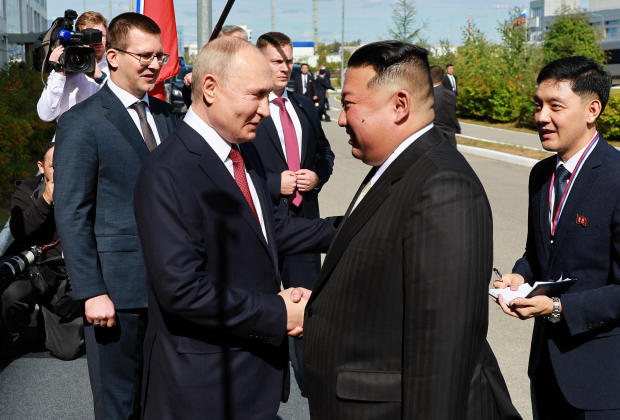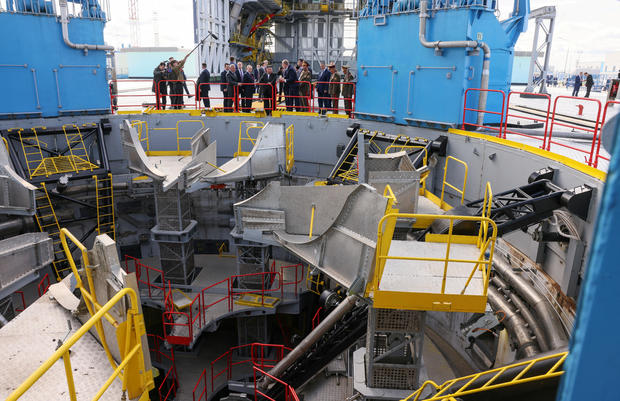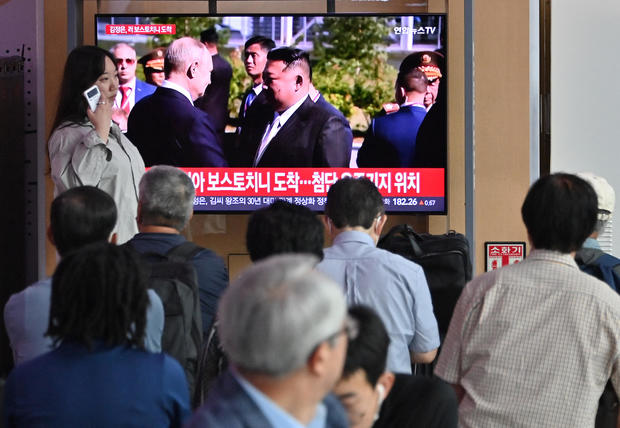Seoul, South Korea — North Korean leader Kim Jong Un told Russian President Vladimir Putin on Wednesday that he could count on his country’s “full and unconditional support” for Russia’s “sacred fight” to defend its security interests, in an apparent reference to the war in Ukraine. Kim said North Korea would always stand with Russia on the “anti-imperialist” front.
The allies’ meeting at a remote Russian space launch facility came amid mounting concern that the two heavily-sanctioned countries may strike a deal to exchange weapons and satellite technology that could give Putin a boost in his flailing war in Ukraine and propel North Korea more quickly toward its goals of launching spy satellites into orbit and obtaining a long-range nuclear missile capability.
Kim called North Korea’s relations with Russia his nation’s “first priority,” while Putin later said that despite United Nations sanctions barring the supply of weaponry to Kim’s country, he saw “opportunities for cooperation.”
Sputnik / Vladimir Smirnov / Pool via REUTERS
The leaders met for about two hours at a remote Siberian rocket launch facility for a summit that underscored how their interests are aligning in the face of their countries’ separate, intensifying confrontations with the United States. They later continued their talks in different formats, meeting for a total of four to five hours, officials said.
Putin, in his opening remarks, welcomed Kim to Russia and said he was glad to see him. Putin listed economic cooperation, humanitarian issues and the “situation in the region” among the agenda items for their talks.
North Korea test fires more missiles
The meeting came hours after North Korea fired two ballistic missiles toward the sea, extending a highly provocative run in North Korean weapons testing since the start of 2022, as Kim used the distraction caused by Putin’s war on Ukraine to accelerate his weapons development.
South Korea’s Joint Chiefs of Staff said the short-range North Korean missiles flew about 400 miles each.
“We strongly condemn North Korea’s successive ballistic missile launches as a serious act of provocation that undermines the peace and stability of the Korean Peninsula as well as the international community, and a clear violation of U.N. Security Council resolutions, and urge that it be stopped immediately,” the Joint Chiefs said in a statement.
North Korea wants satellites, weapons tech and food
Moscow’s decision to hold the Kim-Putin summit at the cosmodrome, Russia’s most important domestic satellite launch facility, suggested Kim was seeking Russian technical assistance for his efforts to develop military reconnaissance satellites, which he has described as crucial in enhancing the threat of his nuclear-capable missiles. In recent months, North Korea has repeatedly failed to put its first military spy satellite into orbit.
Sputnik / Mikhail Metzel / Kremlin via REUTERS
Official photos showed Kim accompanied by Pak Thae Song, chairman of North Korea’s space science and technology committee, and navy Adm. Kim Myong Sik, who are linked with North Korean efforts to acquire spy satellites and nuclear-capable ballistic missile submarines, according to South Korea’s Unification Ministry.
Asked whether Russia would help North Korea build and launch satellites, Putin was quoted by Russian state media as saying “that’s why we have come here.”
“The DPRK leader shows keen interest in rocket technology. They’re trying to develop space, too,” he said, using the abbreviation for North Korea’s formal name, the Democratic People’s Republic of Korea. Asked about military cooperation, Putin said before their meeting that he and Kim would “talk about all issues without a rush. There is time.”
MIKHAIL METZEL/POOL / AFP via Getty Images
A senior South Korean official recently told CBS News that Seoul was concerned Pyongyang could seek technology for nuclear-powered submarines and satellites from Russia in exchange for badly needed weapons and ammunition for Putin’s ongoing war in Ukraine.
But as CBS News correspondent Imtiaz Tyab reports, Kim’s impoverished nation needs far more than advanced technology. After years of diplomatic isolation and crippling U.N. sanctions, it’s also looking for allies, food aid, and even cold, hard cash.
Deputy Foreign Minister Andrei Rudenko said Russia could discuss humanitarian aid with the North Korean delegation, according to Russian news agencies.
Putin wants weapons for his Ukraine war
Putin welcomed Kim’s limousine, brought from Pyongyang in the North Korean leader’s special armored train, at the entrance to the launch facility with a handshake that lasted around 40 seconds.
For Putin, the meeting with Kim was an opportunity to refill ammunition stores that the 18-month-old war has drained. North Korea may have tens of millions of aging artillery shells and rockets based on Soviet designs that could give a huge boost to the Russian army in Ukraine, analysts say.
Kim also brought Jo Chun Ryong, a ruling party official in charge of munitions policies who joined him on recent tours of factories producing artillery shells and missiles, according to South Korea.
Kim said his decision to visit Russia four years after his previous visit showed how Pyongyang is “prioritizing the strategic importance” of its relations with Moscow, North Korea’s official news agency said Wednesday.
JUNG YEON-JE / AFP via Getty Images
An arms deal would violate international sanctions that Russia supported in the past.
Asked about the potential of an arms deal with Kim after their meeting on Wednesday, Putin said Russia “complies with international obligations, but within the framework of the rules there are opportunities for cooperation.” He did not go into detail about any agreement discussed with his North Korean counterpart.
Lim Soo-suk, South Korea’s Foreign Ministry spokesperson, said earlier that Seoul was maintaining communication with Moscow and closely monitoring Kim’s visit.
“No U.N. member state should violate Security Council sanctions against North Korea by engaging in an illegal trade of arms, and must certainly not engage in military cooperation with North Korea that undermines the peace and stability of the international community,” Lim said at a briefing.
The United States has accused North Korea of providing Russia with arms, including selling artillery shells to the Russian mercenary group Wagner. Both Russian and North Korean officials denied such claims.
API/Gamma-Rapho/Getty
Speculation about their military cooperation grew after Russia’s defense minister visited North Korea in July. Kim subsequently toured his weapons factories, which experts said had the dual goal of encouraging the modernization of North Korean weaponry and examining artillery and other supplies that could be exported to Russia.






